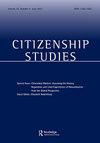公民身份研究中的去西方主义:来自中国的启示
IF 1.9
3区 社会学
Q3 POLITICAL SCIENCE
引用次数: 4
摘要
现代公民权以西方为中心,以韦伯主义和马绍尔主义为核心范式。这种正统的观点掩盖了公民身份的多样性。在过去的三十年里,公民研究的三种趋势挑战了这种“正统共识”:公民权利的主题和内容的多样化;“东方主义之后的公民”,主张将东方社会纳入公民研究;以及“公民行为”,将公民的核心从权利转移到行为。这些方法以“去西方主义”为目标,从更广泛的角度促进了对公民身份的研究。中国的公民权经验表明,去西方化需要进一步推进。我们需要采用更多元化的视角,进一步去西方化,丰富我们对公民身份的理解。在本文中,“情境主义”和“公民之树”被提倡为更强烈的去西方化观点。本文章由计算机程序翻译,如有差异,请以英文原文为准。
Towards de-Westernism in citizenship studies: implications from China
ABSTRACT Modern citizenship is Western-centric, featuring Weberianism and Marshallianism as core paradigms. That orthodox view obscures the diversity of citizenship. Over the past three decades, three trends in citizenship studies have challenged this ‘orthodox consensus’: the diversification of the subjects and contents of citizenship rights; ‘citizenship after Orientalism’, which advocates bringing oriental societies into citizenship studies; and ‘acts of citizenship’, which shifts the core of citizenship from rights to acts. Sharing ‘de-Westernism’ as a goal, these approaches promote the study of citizenship from a wider range of perspectives. The Chinese experience of citizenship shows that de-Westernism needs to be taken further. We need to adopt even more diverse perspectives to further de-Westernise and enrich our understanding of citizenship. In this paper, ‘contextualism’ and the ‘tree of citizenship’ are advocated as more strongly de-Westernised perspectives.
求助全文
通过发布文献求助,成功后即可免费获取论文全文。
去求助
来源期刊

Citizenship Studies
POLITICAL SCIENCE-
CiteScore
3.60
自引率
11.10%
发文量
85
期刊介绍:
Citizenship Studies publishes internationally recognised scholarly work on contemporary issues in citizenship, human rights and democratic processes from an interdisciplinary perspective covering the fields of politics, sociology, history and cultural studies. It seeks to lead an international debate on the academic analysis of citizenship, and also aims to cross the division between internal and academic and external public debate. The journal focuses on debates that move beyond conventional notions of citizenship, and treats citizenship as a strategic concept that is central in the analysis of identity, participation, empowerment, human rights and the public interest.
 求助内容:
求助内容: 应助结果提醒方式:
应助结果提醒方式:


